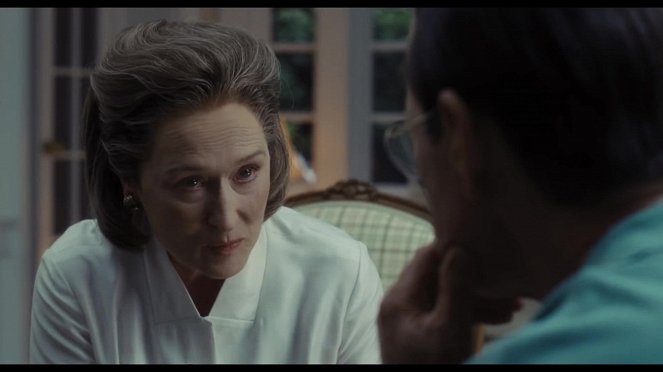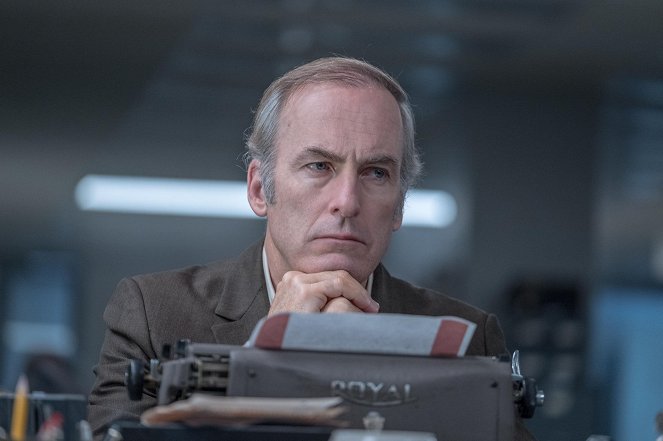Directed by:
Steven SpielbergCinematography:
Janusz KaminskiComposer:
John WilliamsCast:
Meryl Streep, Tom Hanks, Sarah Paulson, Bob Odenkirk, Tracy Letts, Bradley Whitford, Bruce Greenwood, Matthew Rhys, Alison Brie, Carrie Coon, Jesse Plemons (more)VOD (3)
Plots(1)
Set in 1971, 'Washington Post' publisher Katharine Graham (Meryl Streep) faces the difficult decision of whether to publish documents surrounding the American government's communications during the Vietnam War, brought to her by military analyst Daniel Ellsberg (Matthew Rhys). Within the papers are the communications of Secretary of Defense Robert McNamara (Bruce Greenwood) in which he revealed his belief of the war being unwinnable but stood by his decision to send American men to Southeast Asia and their certain death. (Entertainment One)
(more)Videos (25)
Reviews (12)
I expected The Post to be a good movie. I did not expect it to be nearly flawless. There is much to be admired in it, especially knowing that the project was announced in March 2017 and was in cinemas by December, but what I enjoyed the most was how various subworlds (family and work, men and women, friends and colleagues, The Washington Post and The New York Times) constantly collide in the film at the level of both narrative and style, which adds dynamics and layering to a film that is largely based on a few people in a room discussing huge amounts of data or deciding on something essential. ___ The differences between the worlds among which the characters move are made clear thanks especially to Kamiński’s camerawork and the directorial control of the space in front of the camera. There is almost no shot that does not convey something through its composition, the placement of the actors, the inevitability with which the characters dominate the given setting (Kay is more comfortable at home, Ben in the newsroom), the contrast of events in the foreground and background, the speed and direction of camera movements.... At the same time, the film never comes across as didactic, but rather as something entirely natural and organic. For example, granddaughters running in the garden in the background during a work conversation between Ben and Kay, and the camera’s sharp glance at a portrait of the female protagonist’s father hanging on a column that she walks past gives the scenes extraordinary emotional depth without descending into sentimentality and slowing down the narrative. ___ Even though we are subjected to a constant flow of information, especially in the first half, which covers several days (in the second half, the field of possibilities of how the narrative can develop further is significantly narrowed and mostly takes place in a single day, thus making it even more suspenseful), you can still find your bearings in the film and know where it is headed thanks to the clarity with which it was made. ___ Thematically, The Post is a prequel to All the President’s Men on the one hand and, on the other hand, another Spielberg story about an absent father, a family (due mainly to which a night-time conversation with the daughter is important, though for many that will be irritating proof that Spielberg can’t handle endings) and the occasional necessity of bending certain rules in order to keep democracy alive. For only the third time in a Spielberg film (after The Color Purple and The BFG), there is at the centre of events a female protagonist around which all storylines and motifs – the fight with the government, social expectations, self-confidence – converge (initially intersecting roughly halfway through the film, until which time Kay does not become involved in the newspaper’s contents). ___ The Post is thus relevant not only as a critique of unlimited power and defence of freedom of the press, but also as a story about a woman who has to risk everything in order to show men that she is just as capable as they are and to thus achieve, at the individual level, the same freedom desired by newspapers to write without sanction about dubious government activities (the strongest scenes include those in which Meryl Streep finds herself surrounded by men who literally and figuratively prevent her from moving and to whom she first submits before gradually learning to stand up to them).___ Due to its seeming lack of action, Spielberg’s latest work will not be easy to follow particularly for non-American viewers (especially those who don’t pay attention to what the film conveys visually), but if you liked Lincoln, you should be very pleased with The Post, despite its being even less of a spectacle (the most epic scene depicts the printing and distribution of newspapers). 90%
()
(less)
(more)
A sterile biographical borefest where, apart from the lavish production design and a few typically fine-tuned camera shots by Kaminski, you can't really tell it was made by a top filmmaker. Spielberg lounging in the living room, coffee in hand, feet up on the table. Hanks and Streep purely routine – doing their standard.
()
I suppose that if I were an American patriot, I would be brimming with joy. Not only because freedom of the press in the most democratic democracy in the entire Milky Way was defended, but also because of the black editor. I wonder how many of them worked in the journalistic industry in the US in 1975. Actually, what am I saying, definitely a lot, in such a democratic country, it must have been quite easy for women and black people. And that’s the whole problem, I spent more time thinking about these issues, because the story itself was pretty dull. The third star goes to the cast; I was pleased with the performance of Matthew Rhys and Jesse Plemons.
()
Spielberg is really at home with these political issues. Maybe even too much. More than would be necessary. When I put on The Post, the initial shots of Vietnam were flawless. I even realized that I could easily imagine a film set in Vietnam and I wouldn’t mind it being repetitive at all. But after a while, the story goes where it needs to and so the story of the journalists sets off and that completely numbed me. As if they wanted to turn every turd into a movie in the US.
()
The Post is the essence of Spielberg at his best, a deeply professionally made story with excellent actors, incredibly flesh-and-blood cinematography, and an overall slickness and elegance that is beautiful to look at and easily addictive. It's not a masterpiece in Spielberg's filmography, but the standards of a good movie are met quite easily. The chosen theme is also quite ambitious and politically shaky in the truest sense of the word (even in today's context), while offering some interesting civil/moral dilemmas. The overall impression is thus slightly above expectations.
()


